- Featured
- Agriculture
- Anti-Corporate
- Antiwar
- Banking
- Budget
- Campaign Finance Reform
- Civil Liberties / Surveillance
- Civil Rights
- Economic Justice
- Education
- Elections
- Environment
- Government Accountability / Whistleblowers
- Gun Violence Prevention
- International
- Justice
- Law Enforcement
- LGBT
- Marijuana
- Media
- Nuclear
- Post Office
- Prisons
- Reform
- Retirement and Healthcare
- Taxes
- Torture
- Trade
- More
-
Demand that Indiana DOC Restore Kevin "Rashid" Johnson's Access to His PropertyKevin “Rashid” Johnson (IDOC# 264847) – a Virginia prisoner – was transferred to Indiana on November 4. His transfer was authorized under the Interstate Corrections Compact, commonly used to ship prisoners out of state. Virginia is one of several states that make use of this practice as a tool to repress and isolate prisoners who speak up for their rights. These transfers are extremely disruptive, and serve as an opportunity for prison officials to violate prisoners’ rights, especially regarding their property. This is exactly what has been done to Rashid. Rashid has 24 boxes of personal property. These are all of his possessions in the world. Much of these 24 boxes consist of legal documents and research materials, including materials directly related to pending or anticipated court cases, and his list of addresses and phone numbers of media contacts, human rights advocates, outside supporters, and friends. At Pendleton Correctional Facility, where Rashid is now being kept prisoner and in solitary confinement, only one guard is in charge of the property room. This is very unusual, as the property room is where all of the prisoners’ belongings that are not in their cells are kept. The guard in charge, Dale Davis, has a dubious reputation. Prisoners complain that property goes missing, and their requests to access their belongings – that by law are supposed to be met within 7 days, or if there are court deadlines within 24 hours – are often ignored, answered improperly, or what they receive does not correspond to what they have asked for. Despite having a need for legal and research documents for pending and anticipated court cases, his requests to receive his property have not been properly answered. The property officer, Dale Davis, is supposed to inventory the prisoners’ property with them (and a witness) present, according to IDOC regulation 02-01-101-VIII; this was never done. When Rashid did receive some property, it was a random selection of items unrelated to what he asked for, brought to the segregation unit in a box and a footlocker and left in an insecure area where things could be stolen or tampered with. On December 19th, Rashid received notice that Davis had confiscated various documents deemed to be “security threat group” or “gang” related from his property. Rashid has no idea what these might be, as (contrary to the prison regulations) he was not present when his property was gone through. Rashid does not know how much or how little was confiscated, or what the rationale was for its being described as “gang” related. None of Rashid’s property should be confiscated or thrown out under any circumstances, but it is worth noting that the way in which this has been done contravenes the prison’s own regulations and policies! Dale Davis has been an IDOC property officer for 8 years. He has boasted about how he does not need any oversight or anyone else working with him, even though it is very unusual for just one person to have this responsibility. Prisoners’ property goes “missing” or is tampered with, and prisoners’ rights – as laid out by the Indiana Department of Corrections – are not being respected. Rashid is not asking to have all of his property made available to him in his cell. He is willing to accept only having access to some of it at a time, for instance as he needs it to prepare court documents or for his research and writing. After two months in Indiana, he has still not been supplied with his documents containing the phone numbers and addresses of his loved ones and supporters, effectively sabotaging his relationships on the outside. Rashid is not asking for any kind of special treatment, he is only asking for the prison property room to follow the prison’s own rules. We ask that you look into this, and make sure that Mr. Johnson's right to access his property is being respected, and that something be done about the irregularities in the Pendleton property room. We ask that the rules of the Indiana Department of Corrections be respected. Call the Pendleton Correctional Facility and to ask to speak to the Warden or to someone in the Warden’s office. Also, call the Indiana Department of Corrections and ask that they intervene to make sure Rashid gets access to his property. In each case, please be prepared to give a name and phone number for them to call you back, if needed. Please make phone calls to: Indiana Department of Corrections Stephanie Lightfoot (317) 232-5711 - press 2, press 3, press 2 You may get a voicemail, in which case please leave a detailed message. Pendleton Correctional Facility (765) 778-2107; press 3 and then press 1 You will get a receptionist; explain that you would like to convey your concerns to the warden or to someone in charge, about problems Kevin Johnson is having accessing his property. For updates on Rashid and to access his writings, go to http://rashidmod.com/5,894 of 6,000 SignaturesCreated by Jamani M.
-
Help Free an Unfairly Prosecuted Man from PrisonTruthout reports: "Hamilton was imprisoned with a man named Darnell Thompson, who claims he was threatened by police into pinning the crime on Hamilton. In an affidavit reviewed by Truthout, Thompson said that homicide detectives and prisoner Olivera Rico Cowen conspired to pressure him into testifying against Hamilton. Thompson, who was 18 at the time, says he was coerced into signing a statement against Hamilton, but he later refused to testify against Hamilton in court. But Thompson’s statement, as well as Cowen’s testimony and testimony about Hamilton’s character by a neighbor, were enough for a jury to convict Hamilton to a maximum of 80 years in prison." Lacino Hamilton has said, "There was no physical evidence for the crime I was accused of -- only manufactured by detectives, detectives who wrote a script for them to perform at trial. And when the prosecutor’s office was approached by several attorneys with credible evidence that this was a common police practice, the prosecutor’s office simply forged ahead. I was convicted and sentenced to 52 to 80 years. They just threw me away, like I was garbage." Affidavits, courthouse transcripts, letters and internal memos obtained by Truthout suggest that Darnell Thompson – who is now long deceased – was in fact part of a ring of jailhouse informants – or “snitches” – that allegedly received lenient sentences as well as other monetary and special privileges from detectives in the Detroit Police Department’s homicide division in exchange for making false statements against dozens of prisoners eventually convicted of murder, Lacino just being one of them... “Informants lie primarily in exchange for lenience for their own crimes, although sometimes they lie for money,” according to an article in Golden Gate University Law Review. Testimony from a single jailhouse informant is enough to convict a person for a charge as serious as murder, according to Valerie Newman, assistant defender in Michigan’s State Appellate Defender Office. Hamilton says the reason his original defense attorney did not challenge the prosecutor’s use of an informant speaks to some of the reasons Black communities across the country suffer at the hands of the state: neglect and an assumption of disposability. After being sent to prison, Lacino spent four of his first six years in solitary confinement. It was there that he began to read, think critically and write about the many ways the U.S. criminal justice system perpetuates values of anti-black violence, coercion and oppression. “How some of us live is not a mistake; neither is it the product of a broken system,” he wrote from prison. “We live like that because it is profitable to a lot of people[‘s] businesses…. “I am locked in a windowless cell measuring 10×8 feet, 23 hours per day. For one hour every other day, I am handcuffed, chained around the waist and allowed exercise and a shower in a small cage. I am not allowed to interact with others, or to participate in any educational, vocational, or employment programs. All meals are delivered to the cell. I have no access to a phone.” After nearly two decades of wrongful imprisonment, Hamilton spends most of his time reading and writing about the experience of incarceration. He also spends his time working tirelessly to plead his case and affirm his innocence. After writing to thousands of journalists, lawyers and colleges to plead his case, Hamilton was able to get in touch with Claudia Whitman from the National Death Row Assistance Network, who supplied Truthout with most of the documents behind his story. Whitman also made contact with Christopher Brooks, the prisoner who says he knows who really killed Hamilton’s foster mother. With Whitman’s help, Hamilton was able to convince an attorney to work pro bono to overturn his conviction. The Conviction Integrity Unit of Wayne County, Michigan must do everything in its power to investigate and reverse this wrongful conviction. The Conviction Integrity Unit of Wayne County investigates claims of innocence, to determine whether there is clear and convincing new evidence that the convicted defendant was not the person who committed the conviction offense. As stated in the American Bar Association standards, Rule 3.8(h), "When a prosecutor knows of clear and convincing evidence establishing that a defendant in the prosecutor's jurisdiction was convicted of an offense that the defendant did not commit, the prosecutor shall seek to remedy the conviction." In the case of The People of the State of Michigan vs. Lacino Hamilton, there is clear and convincing new evidence that the convicted defendant was not the person who committed the conviction offense. In accordance with Rule 3.8(h), it is the duty of the Wayne County Prosecutor’s Office to investigate and reverse the conviction of Lacino Hamilton. Lacino Hamilton needs your help to affirm his innocence. After nearly two decades of wrongful imprisonment, he deserves immediate justice. Background: > Truthout: Ring of Snitches: How Detroit Police Slapped False Murder Convictions on Young Black Men https://truthout.org/articles/ring-of-snitches-how-detroit-police-slapped-false-murder-convictions-on-young-black-men Write a letter of support to Lacino: Lacino Hamilton, Inmate ID: 247310 Marquette Prison 1960 US Highway 41 South Marquette, MI, 498553,535 of 4,000 SignaturesCreated by Jamani M.
-
Don't Stand in the Way of Justice for Mumia Abu-Jamal! Don't Appeal Judge Tucker's Decision!Mumia Abu-Jamal has always maintained his innocence in the 1981 fatal shooting of Philadelphia police officer Daniel Faulkner. His prosecution was politically-motivated because of his Black Panther Party membership, his support of the MOVE organization and as a radical journalist. His 1982 trial and subsequent 1995 PCRA appeals were racially biased: the prosecution excluded African Americans from the jury; and PCRA trial Judge Albert Sabo, the same judge in Abu-Jamal's initial trial, declared, “I’m gonna help them fry the n----r.” On Dec. 27, Mumia Abu-Jamal won a significant case before Judge Leon Tucker in a decision granting him new rights of appeal.3,378 of 4,000 SignaturesCreated by Mobilization F.
-
Release Kevin "Rashid" Johnson From Solitary Confinement ImmediatelyKevin “Rashid” Johnson has been a Virginia prisoner (#1007485) since 1990. During his imprisonment, he became a human rights advocate and a journalist. His journalistic work in particular exposes abuses by prison administration and staff. His related steps toward litigation have resulted in his being “interstate compacted” or transferred to prisons in different states. Currently, Rashid is being held in solitary confinement with no legitimate security justification at Sussex I State Prison in Virginia. Between 2012 and June of 2018, Kevin "Rashid" Johnson was transferred to prisons in three other states (Oregon, Texas, and Florida) before being returned to Virginia. He was kept in solitary confinement in Texas and Florida, where he witnessed and suffered many acts of abuse by prison staff. All this, in reprisal for his political and journalistic activity. Each state prison transfer has subjected Rashid to serious abuses -- including, while in northern Florida last January, being caged for over a week in a freezing cold cell without heat or a blanket. Over the years, Rashid has had his life threatened by corrections officers and has endured explicit, violent retaliation for exercising his First Amendment right of protected free speech. Rashid expects to be transferred again soon and fears being subjected to extreme isolation. Kevin Rashid Johnson does not call for violence or illegal activity and has not been charged with anything of the kind during his imprisonment. He is not a threat to the Virginia Department of Corrections – he is an imprisoned journalist and human rights advocate – and should be released from solitary confinement immediately. Solitary confinement has been increasingly recognized by courts and society as a form of torture. This punitive measure has been imposed on Kevin Johnson not because of any violent conduct on his part but because of his relentless exposure of abuses by prison officials, his willingness to challenge those abuses through the legal system, and his efforts to educate fellow prisoners and encourage them to challenge by peaceful means the unhealthy and humiliating conditions to which they are subjected. Using solitary confinement as a tool to silence someone who exposes prison abuses and advocates for prison reform is a human rights abuse and unconstitutional. We call for the immediate release of Kevin Johnson from solitary confinement and for the VADOC not to transfer him again out of state.11,122 of 15,000 SignaturesCreated by Jamani M.
-
Pass the Equality Act to Protect LGBTQ Americans from DiscriminationWhile the groundbreaking Marriage Equality Act expanded marital protections for LGBTQ people in 2015, there is still much to be done to ensure non-discrimination protections and equal treatment under the law. Federal law and the majority of states lack explicit non-discrimination protections for LGBTQ people at work, at school, and elsewhere, leaving them vulnerable to discrimination. In other words, a person can be fired from their job, evicted from their home, denied access to housing, credit, loans, hotel services, and even jury duty on the strict basis of their sexual orientation or gender identity. The Equality Act would amend the Civil Rights Act of 1964 and other key federal non-discrimination laws to provide clear, explicit federal protection against discrimination based on sex, sexual orientation or gender identity in employment, housing, credit, federally funded programs (including education), and federal jury service. The bill would provide clear, explicit federal protections against discrimination based on sexual orientation and gender identity in the following six areas: ● Employment: The Equality Act would explicitly prohibit discrimination on the basis of sexual orientation and gender identity in employment and in the workplace. ● Federally funded programs and activities: Any program that receives federal funds would be prohibited from discriminating on the basis of sexual orientation or gender identity. This provision would protect LGBTQ people from discrimination by institutions that receive federal funds – including schools, hospitals, domestic violence shelters, and police departments. ● Housing: The Equality Act provides explicit protections for LGBTQ people against housing discrimination. ● Public Spaces and Services: LGBTQ people would be protected from discrimination in “public accommodations,” including stores, restaurants, hotels, transportation, and healthcare services. ● Banks and Credit: The Equality Act would explicitly prohibit discrimination on the basis of sexual orientation and gender identity in credit, financing, and lending. ● Federal Jury Service: The Equality Act would explicitly prohibit discrimination against LGBTQ people in selecting federal juries. All LGBTQ Americans deserve a fair chance to live, love and provide for their families without the burden of legalized discrimination. This bill will help ensure that no one is fired, evicted from their home, or denied basic services because of who they are or whom they love. Urge your members of Congress to support this critical piece of legislation. H.R. 2282, The Equality Act https://www.congress.gov/bill/115th-congress/house-bill/2282?q=%7B%22search%22%3A%5B%22Equality+Act%22%5D%7D&r=1 Human Rights Campaign: Why the Equality Act? https://www.hrc.org/resources/why-the-equality-act10,551 of 15,000 SignaturesCreated by Jamani M.
-
My Last Gas CarThere is a consensus among climatologists that change in our climate is unprecedented. Major climate forces causing the change are from human activity. The main activity being the burning of fossil fuels of which use of personal automobiles is a major factor. We ordinary people can make an impact on climate change in a drastic and effective way. Progressive change for complex social problems comes about in one way. Mass popular movements. Collectively, let’s tell automakers what we are willing to give up. Some sacrifice is needed by many people to make change happen. Send a message clearly stating you are giving up on gasoline powered vehicles. Some automakers are moving in this direction but too slowly. And it is not enough! Let’s send a real message of change. Refuse to buy another car or truck that runs on gasoline. It is consumer demand that dictates what is produced and what is sold not automakers. Let’s tell them simply what we want. An electric vehicle that can be powered by renewable energy sources. Sign this petition and commit to the decision along with many, many others to not buy gasoline powered cars. Let’s be dedicated to contributing to a more stable climate and a better future for our families, friends and communities.620 of 800 SignaturesCreated by David D.
-
Undo Unconstitutional Life-Without-Parole Sentence for Bobby BosticBobby Bostic was only 16 years old when he was sentenced to 241 years in prison for non-fatal crimes. He is now 38, and will not be eligible for parole until he is 112 years old. Despite two recent U.S. Supreme Court rulings that determined life without parole sentencing for juveniles who have not been convicted of murder to be unconstitutional, the state of Missouri has repeatedly refused to offer Bobby an appeal. We must stand with Bobby in his effort to take his appeal, if necessary, to the U.S. Supreme Court. In 1995, Bobby Bostic and an older accomplice were convicted of 18 crimes stemming from an armed robbery and carjacking. While the older accomplice pleaded guilty and took a plea bargain for a 30-year sentence, Bostic took the case to trial. He was found guilty on all counts and was given the maximum possible sentence: 241 years. "Your mandatory date to go in front of a parole board will be the year 2201," the judge said. "Nobody in this room is going to be alive in the year 2201." At the time, Bobby was just 16 years old. "Two of the Supreme Court's rulings in recent years have barred judges from imposing sentences of life without parole for juveniles who haven't killed anyone," reports Riverfront Times. "But Missouri is one of a small number of states arguing that doesn't apply to defendants who aren't technically sentenced to life without parole — even if their sentences add up to just that." In addition, the Missouri Supreme Court has defended its ruling by claiming that the U.S. Supreme Court rulings pertain only to defendants convicted of a single charge, not multiple charges added together. "In practice, that means Bostic would have been better off committing a single act of murder than being convicted of multiple, non-fatal crimes," noted Doyle Murphy, a journalist at the Riverfront Times. Bostic's sentence also violates the Convention on the Rights of the Child, a treaty to which every single nation on earth other than the United States is party, and which is therefore international law. The treaty states: "Neither capital punishment nor life imprisonment without possibility of release shall be imposed for offenses committed by persons below eighteen years of age." While Bobby Bostic awaits his parole date in over 100 years from now, his accomplice will be eligible for parole next year. The case of Bobby Bostic illuminates the punitive nature of the U.S. criminal justice system. Instead of managing prisons as spaces of rehabilitation, the U.S. Department of so-called Corrections has made it a point to punish offenders in the most retributive ways possible, depriving juveniles like Bostic of any meaningful opportunity to obtain release. According to the ACLU's state legal director, Tony Rothert, "Bobby Bostic should get a chance to show that crimes he committed as a teen do not define him. The Constitution demands nothing less." Background: Riverfront Times: Bobby Bostic, Sentenced as a Teen to 241 Years, Appeals to U.S. Supreme Court https://www.riverfronttimes.com/newsblog/2017/12/21/bobby-bostic-sentenced-as-a-teen-to-241-years-appeals-to-us-supreme-court13,977 of 15,000 SignaturesCreated by Jamani M.
-
Support OperationPUSHJanuary 15 marked the beginning of a month-long work stoppage organized by prisoners throughout the Florida Department of Corrections demanding an immediate end to unpaid labor and inhumane working conditions at their facilities. The strike, announced in late December, aims to force corrections officials to pay prison laborers monetary compensation for their work as opposed to “the current slave arrangement,” in which they are paid in time deducted from their sentences. In written statements to news media, the strikers have also demanded increased access to parole, cheaper and more reasonable prices for basic food and hygiene items, voting rights for former felons, and an end to prison-guard brutality. The organized strike began on Martin Luther King Jr. Day — and is named #OperationPUSH, after civil rights leader Jesse Jackson’s 1970s-1990s campaign to improve economic conditions for African Americans. Almost a third of Florida inmates are black, compared with fewer than 17% in the general population. Florida has the nation’s third-largest prison system in the United States, with 97,000 inmates. Prison work inside Florida correctional facilities consists of doing laundry, cooking, cleaning, maintaining the facilities, and even growing food for the inmate population. Before the strike began, one organizer wrote that “[the strike’s] goal is to make the Governor realize that it will cost the state of Florida millions of dollars daily to contract outside companies to come and cook, clean, and handle the maintenance, [which] will cause a total breakdown." Outside of the prison, incarcerated laborers work in “community work squads,” providing free labor to state offices such as the Department of Transportation, the Division of Forestry, and the Department of Environmental Protection. According report by the FDOC, “community work squads” worked over 3.15 million hours in 2017 alone and saved the state more than $38 million in payroll expenses, including flooding and debris cleanup work after Hurricane Irma. Ironically, these same incarcerated workers are barred from employment at the state-level upon release, due to their criminal records. Another incarcerated organizer wrote that Florida prisoners “want to create an environment where someone can do their time, be rehabilitated, and enter into society with some type of hope…that would be helpful for society instead of creating a revolving door where you lock people up and just set them up for failure so that they keep coming back.” In fear of retaliation, these organizers have asked to remain anonymous. One week into the month-long work stoppage, internal sources have reported the participation of strikers in at least eight different Florida facilities in the FDOC. Internal sources have reported that many of these strikers have been placed into solitary confinement by correctional officials. In solidarity with prisoners, marches and protests have been organized throughout the state, and more than 135 civil rights and activist groups, including local chapters of the NAACP and the Florida Women's March, have voiced their support for #OperationPUSH. At a speech at Florida State University, civil rights leader Angela Davis said there is "no better way to keep the legacy of Dr. King alive than by supporting the prisoners' strike." Will you sign the petition to support #OperationPUSH and to demand an immediate end to unpaid labor and inhumane work conditions in Florida prisons? Sources: Movement Against Prison Slavery Ramps Up With OperationPUSH in Florida https://shadowproof.com/2018/01/11/operation-push-movement-against-prison-slavery-florida/ Florida Prisoners Set to Strike January 15th Against Prison Slavery https://itsgoingdown.org/florida-prisoners-set-strike-january-15th-prison-slavery/ Striking Florida Prisoners Thrown in Solitary Confinement, Activists Say http://www.miaminewtimes.com/news/striking-operationpush-florida-prisioners-placed-in-solitary-activists-say-100069004,790 of 5,000 SignaturesCreated by Jamani M.
-
If You Don't Want War, Don't Pay For It!Many Americans hold deeply held beliefs against participating in war. The government recognizes conscientious objection to military service but doesn't for income tax payment. H.R. 1947 will allow people morally opposed to having the portion of their income taxes used for military purposes directed to non-military spending. This will stop our income taxes from being conscripted. This is a First Amendment constitutional issue! Find out more: National Campaign for a Peace Tax Fund13 of 100 SignaturesCreated by National Campaign for a Peace Tax Fund P.
-
Make NJ DSC TransparentThe Northeast Democratic Party has a reputation of being corrupt. We have to start somewhere.9 of 100 SignaturesCreated by Elly F.
-
Universal Basic Income1. Automation results in Human ineligibility for Jobs: https://www.youtube.com/watch?v=7Pq-S557XQU Based on location / nation the pace would differ, but the implications seem universal affecting people everywhere. 2. To address human economic needs, a global transition to a Universal Basic Income (UBI), (not 'welfare'), is called for, and a way to implement the same is given below : https://www.youtube.com/watch?v=OEkT14RBzDI 3. Under UBI, taxation (essential in any society) could be realized as follows: https://www.youtube.com/watch?v=SQXxcjJ5ODw Support.35 of 100 SignaturesCreated by Radh A.
-
Protect Bethesda African CemeteryThis community built the main thoroughfares in the county. It manufactured building materials and provided the manpower building the bunker under the White House. By around the 1850s free Africans owned property in Bethesda but were confined to a small area by covenants preventing them and Jews from living elsewhere. A community once thrived there. That history has been erased, but needs to be preserved. A museum could provide the archive for that history as well as serve as the vehicle for conveying the story to future generations. Washington Post death notices, County plat and plot maps, oral histories, aerial photos and other historic materials substantiate the existence and location of the cemetery. No documentation of bodies being disinterred has ever been produced. Currently there is a Sector Plan that seeks to place a parking garage and housing units on top of what is now a parking lot that was placed on top of the African Cemetery (allegedly at least in part to prevent erosion from exposing the remains). History of the enslavement of Africans is American history. More importantly, the triumph of Africans against enslavement in a living museum and memorial will be an ongoing testament to these people, their heritage and their legacy.417 of 500 SignaturesCreated by Honor O.

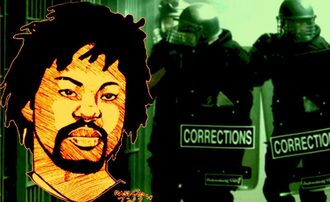
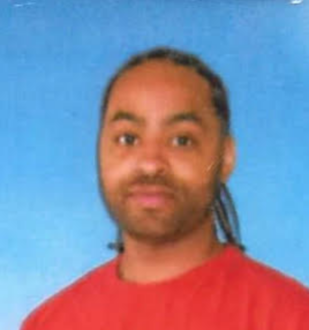
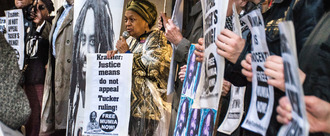




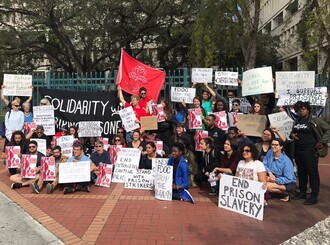.jpg)
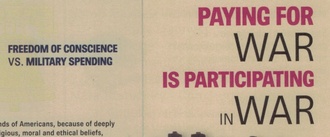.jpg)


